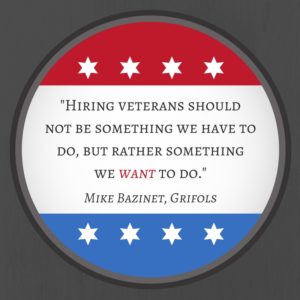Member Mike Bazinet, Associate Director of Plasma Recruitment at Grifols Inc. is authoring a series of guest posts on how employers can be more effective with their veteran recruitment, outreach and retention efforts.
The last few months, I have tried to highlight recruiting military veterans from a different angle. For years, the veteran has been told to adapt, change and be able to articulate what they have done in the service. As far as I can remember that has been the norm when hiring veterans. This tactic simple does not work! We have to change our mindsets to truly affect our veteran hiring program. Over the last four blogs, I have tried to highlight ways we can change to give the veteran a better chance to show off their amazing skill sets.
 Stories – The Common Bond Between All Veterans
Stories – The Common Bond Between All Veterans
I mention “stories” in my first blog. If you truly want to get a veteran talking during an interview, all you have to do is ask them to tell you stories they encountered while in the service. Phrase your questions in a way that will allow them to tell you that story. I promise you, you will learn more from a veteran if they are comfortable enough to tell you their military stories. I realize this is a change from your normal interview techniques but it will be worth it in the end. This new military interview technique will enhance your veteran hiring program, set the veteran up for success and prove to veterans that your organization is truly a military friendly company.
The Fear of the Unknown – What Corporate Recruiters Need to Know Before Interviewing Military Candidates
My second blog was about the Fear of the Unknown and how the veteran is stepping into a completely new world. All of us have at one time or another interviewed for different positions. If you are in Corporate American, you may have interviewed five or more times at different companies. Interviewing for many of us is a common situation that we take for granted. As many of you transition to new jobs, it may take a few weeks for you to truly understand the culture of this new company. Over time, you will meet new colleagues and learn the new operating procedures to function in your new position. When we look at it, not much is really changing. We do it so much it becomes commonplace for us. With that said, we must realize this change for a veteran is much different from our typical experiences.
The Interview from a Veteran’s Point of View
The veterans life is completely changing, they are stepping into a new world that they have never witnessed in their lifetime. In my third blog, I use myself as an example. I joined the service when I was 18 years old and retired at 39–all I knew was the military. I had no idea what it was like to be in Corporate America, my world was turned upside down in one day. I was walking into a world where very few people knew what I did and even fewer truly understood what my life was like for 21 years. My boots changed to dress shoes, the uniform I wore for 21 years changed to new suits and suitcoats, and my confidence in my job went from ten to zero overnight. My whole world was flipped upside down and I was living in the fear of the unknown. Overtime I adapted, which is what every good military veteran does but it was not overnight. It took time to learn this new world. As interviewers, we must remember what the veteran is going to go through when they step away from the service. Our organizations must be ready to accept them and give them the time they need to adapt. This starts at the interview process and our recruiters must be aware of how and what to expect during the interview.
As recruiters or hiring managers that interview our colleagues in Corporate America, we tend to treat them differently depending on their circumstances. In other words, we interview college graduates different than we would interview someone that has 20 years of experience. You may ask similar questions but as interviewers, we tend to view these two types of candidates differently. As the veteran is sitting across from you, you must remember they are viewing this interview with uncertainty and apprehension. Try to remember how you felt on your first interview. You may have been nervous, but for many of you interviewing is part of a civilian’s life, there common for most of you. Now put yourself in the veteran’s shoes. They have never interviewed, this concept of interviewing has never been part of their everyday life. For many of them, their interview acumen is that of a college graduate. We must remember to put ourselves in the shoes of the veterans as best we can to give them an opportunity to shine. Until we realize that the military veteran is looking at this interview from a completely different angle, we will struggle hiring veterans into our workforce.
Putting It All Together
Hiring veterans should not be something we have to do, but rather something we want to do. The men and women of our military all volunteered to protect this nation. They are fathers, mothers, sons and daughters, no different from people in your own families. The only difference is they chose to do something only 5% of this nation does; they chose to put their life in harm’s way so you can have the freedom you enjoy every day. I was one of those veterans; I owe my life and career to the men and women I served with throughout my time. Over the last 7 years, I have dedicated myself to helping veterans find jobs in Corporate America but I cannot do it alone. I need people like you to spread the word, change the way we look at our military hiring practices and truly make an impact on a veteran’s life.
MAKE IT A GOOD DAY, HIRE A VETERAN!
WEBINAR | A Way to a Veteran’s Heart
Hosted by Mike Bazinet, Tuesday, November 15, 2016 at 2:00 PM EST
Register today to learn additional tips and strategy around veteran hiring and how you can improve your current efforts.
 Mike Bazinet is the Associate Director of Plasma Recruitment with Grifols Inc., a global healthcare company that creates 53 annual affirmative action plans. During a 20-year career in the United States Air Force, he recruited pilots, navigators, engineers, medical doctors, nurses and pharmacists. As a civilian, he worked for Orion International, a recruitment organization specializing in assisting retiring and separating veterans to gain access to positions within Corporate America. He was also instrumental in creating and launching the Orion International Health Professions division. In 2008, Mike took a recruiting position at Grifols and was quickly promoted to Supervisor of Recruitment in 2009, then Manager of Recruitment in 2011. In 2014, his team achieved a milestone year, hiring over 3,400 new employees. His team surpassed that milestone in 2015 and hired a total of 3,700 employees into the Grifols family. In his current role as Associate Director of Staffing, Mike has control of the strategic development and process of the recruitment efforts within Grifols Plasma Organization. Since being at Grifols Mike has been directly involved with the affirmative action program at Grifols and has played an integral part in the training and execution of the overall program at Grifols.
Mike Bazinet is the Associate Director of Plasma Recruitment with Grifols Inc., a global healthcare company that creates 53 annual affirmative action plans. During a 20-year career in the United States Air Force, he recruited pilots, navigators, engineers, medical doctors, nurses and pharmacists. As a civilian, he worked for Orion International, a recruitment organization specializing in assisting retiring and separating veterans to gain access to positions within Corporate America. He was also instrumental in creating and launching the Orion International Health Professions division. In 2008, Mike took a recruiting position at Grifols and was quickly promoted to Supervisor of Recruitment in 2009, then Manager of Recruitment in 2011. In 2014, his team achieved a milestone year, hiring over 3,400 new employees. His team surpassed that milestone in 2015 and hired a total of 3,700 employees into the Grifols family. In his current role as Associate Director of Staffing, Mike has control of the strategic development and process of the recruitment efforts within Grifols Plasma Organization. Since being at Grifols Mike has been directly involved with the affirmative action program at Grifols and has played an integral part in the training and execution of the overall program at Grifols.

